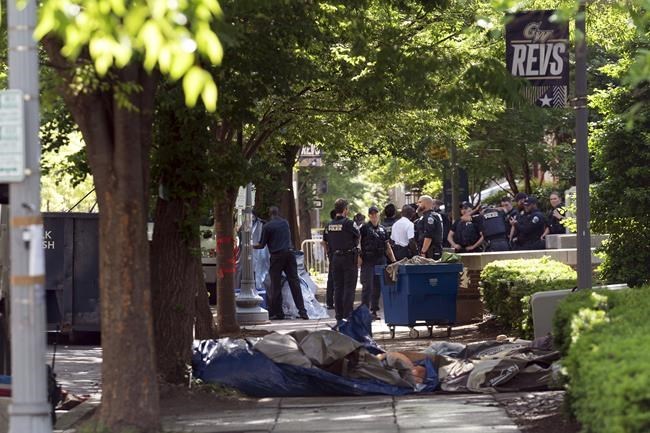WASHINGTON (AP) — Police cleared a pro-Palestinian tent encampment at George Washington University early Wednesday and arrested demonstrators, hours after dozens marched to the home of the school’s president as city officials prepared to appear before Congress on the protest’s handling.
District of Columbia Mayor Muriel Bowser and Metropolitan Police Chief Pamela Smith were called to testify Wednesday afternoon at the Republican-led House Committee on Oversight and Accountability, but the hearing was canceled after the arrests.
After the crackdown, Bowser told reporters that she and police made the decision to clear the camp based on shifting information about increased threats to public safety. “Our response to demonstrations is always rooted in public safety and responsibility,” she said.
Smith said there were signs "the protest was becoming more volatile and less stable.” Among them were indications that protestors had “gathered improvised weapons” and were “casing” university buildings with the possible intention of occupying them, said Jeffery Carroll, the police department's executive assistant chief.
Tensions have ratcheted up in standoffs with protesters of the Israel-Hamas war on campuses across the United States and increasingly in Europe. Some colleges cracked down immediately. Others have tolerated the demonstrations. Some have begun to lose patience and call in police over concerns about disruptions to campus life and safety.
D.C. police said officers moved to disperse demonstrators at George Washington because “there has been a gradual escalation in the volatility of the protest.” They said 33 arrests were made, including for assault on a police officer and unlawful entry. They confirmed they used pepper spray outside the encampment against protesters who were trying to break police lines and enter.
George Washington had warned of possible suspensions for continuing the camp on University Yard. Protesters carrying signs reading “Free Palestine” and “Hands off Rafah" also marched to school President Ellen Granberg’s home Tuesday night.
The school said in a statement: “While the university is committed to protecting students’ rights to free expression, the encampment had evolved into an unlawful activity, with participants in direct violation of multiple university policies and city regulations."
Since April 18, just over 2,600 people have been arrested on 50 campuses, figures based on AP reporting and statements from universities and law enforcement agencies after this latest anti-war movement was launched by a protest at Columbia University in New York.
A pro-Palestinian tent encampment was cleared by officers in riot gear at the University of Chicago on Tuesday after administrators who had initially adopted a permissive approach said the protesters had crossed a line, increasing safety concerns. Hundreds of protesters had gathered for at least eight days until administrators warned them Friday to leave or face removal.
Chicago officers later picked up a barricade erected to keep protesters out of the main gathering space on the campus and moved it toward the demonstrators, some of whom chanted, “Up, up with liberation. Down, down with occupation!” Police and protesters pushed back and forth along the barricade as the officers moved to reestablish control.
“The university remains a place where dissenting voices have many avenues to express themselves, but we cannot enable an environment where the expression of some dominates and disrupts the healthy functioning of the community for the rest,” University of Chicago President Paul Alivisatos wrote.
Other schools are letting protesters hold rallies and organize their encampments as they see fit.
The president of Wesleyan University, a liberal arts school in Connecticut, has commended the on-campus demonstration, which includes a pro-Palestinian tent encampment, as an act of political expression. The camp there has grown from about 20 tents a week ago to more than 100.
“The protesters’ cause is important — bringing attention to the killing of innocent people,” university President Michael Roth wrote to the campus community Thursday. “And we continue to make space for them to do so, as long as that space is not disruptive to campus operations.”
The Rhode Island School of Design’s president, Crystal Williams, spent more than five hours with protesters discussing their demands after students started occupying a building Monday.
On Tuesday the school announced it was relocating classes from the building, which was covered with posters reading “Free Palestine” and “Let Gaza Live.”
Some colleges have tried tactics from appeasement to threats of disciplinary action to clear the way for commencements.
And police moved in Tuesday night to break up an encampment at the University of Massachusetts. Video from the scene in Amherst showed an hours-long operation as dozens of police officers in riot gear systematically tearing down tents and taking protesters into custody. The operation continued into early Wednesday.
UMass Chancellor Javier Reyes said he ordered the sweep after discussions over a wide range of demands failed to yield an agreement to dismantle the encampment and engage in “constructive discussions.”
A week ago, the George Washington encampment was host to a somewhat chaotic visit from several Republican members of the House oversight panel who criticized the protests and condemned Bowser’s refusal at that point to send in police.
Bowser on Monday confirmed the city and police department declined the university’s request to intervene. “We did not have any violence to interrupt on the GW campus,” she said then.
___
Associated Press journalists around the U.S. and world contributed, including Charles Rex Arbogast, Pat Eaton-Robb, Steve LeBlanc, Jeff Amy, Christopher Weber, Mike Corder, Barbara Surk, Rick Callahan, Sarah Brumfield and Pietro de Cristofaro.
Ashraf Khalil, The Associated Press



